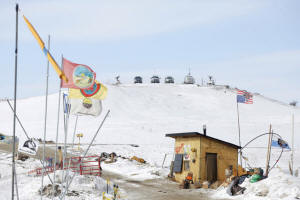|
Construction resumes on Dakota pipeline
despite tribe's challenge
 Send a link to a friend
Send a link to a friend
 [February 10, 2017]
By Terray Sylvester and Liz Hampton [February 10, 2017]
By Terray Sylvester and Liz Hampton
CANNON BALL, N.D./HOUSTON (Reuters) - The
company building an oil pipeline that has fueled sustained public
protests said on Thursday it has started drilling under a North Dakota
lake despite a last-ditch legal challenge from a Native American tribe
leading the opposition.
Energy Transfer Partners LP <ETP.N> is building the $3.8 billion Dakota
Access Pipeline (DAPL) to move crude from the Northern Plains to the
Midwest and then on to the Gulf of Mexico, now saying it could be
operational by early May.
The project had been put on hold under the administration of former
Democratic President Barack Obama, but new President Donald Trump, a
Republican, helped put it back on track.
The federal government this week cleared way for the project to resume,
leading the Standing Rock Sioux Tribe to file a court challenge on
Thursday seeking a temporary restraining order to halt construction and
drilling for the pipeline.
The court set oral arguments on the legal challenge for Monday.
Legal experts say the tribe faces long odds in convincing any court to
halt construction,
Energy Transfer Partners needs only to cross beneath Lake Oahe, part of
the Missouri River system, to connect a final 1,100-foot (335 meter) gap
in the 1,170-mile (1,885 km) pipeline, which will move oil from the
Bakken shale formation to a terminus in Patoka, Illinois.

From there the oil would flow to another pipeline connecting
south-central Illinois to the Gulf of Mexico and that region's numerous
oil refineries.
Native American tribes and climate activists have vowed to fight the
pipeline, fearing it will desecrate sacred sites and endanger a source
of the country's largest drinking water reservoir.
"This administration (Trump's) has expressed utter and complete
disregard for not only our treaty and water rights, but the environment
as a whole," the Standing Rock Sioux Tribe said on Thursday in a
statement on its website.
Supporters say the pipeline will be safer than transporting oil by rail
or road, and industry leaders have praised the project for creating
high-paying jobs
With work on the final tranche now under way, Energy Transfer Partners
expects the Dakota Access Pipeline to begin operations in approximately
83 days, according to a company spokeswoman.
"We have started to drill to go beneath Lake Oahe and expect to be
completed in 60 days with another 23 days to fill the line to Patoka,"
spokeswoman Vicki Granado said in an email.
She declined to specify when drilling began except that it was after the
company received federal permission on Wednesday.
[to top of second column] |

Police vehicles idle on the outskirts of the opposition camp against
the Dakota Access oil pipeline near Cannon Ball, North Dakota.
REUTERS/Terray Sylvester

Public opposition drew thousands of people to the North Dakota
plains last year including high-profile political and celebrity
supporters. Large protest camps popped up near the site, leading to
several violent clashes and some 700 arrests.
A few hardy protesters have remained camped out near the lake,
braving sub-freezing temperatures.
Among them is Frank Archambault, 45, who has lived in the camp since
August when he left his home on the Standing Rock reservation.
"It angers me. It angers me because people are pushing other people
around, breaking laws," Archambault said. "They’re trying to kill us
off by contaminating the water. We’ve had enough."
Ptery Light, 55, of Portland, Oregon, who has lived in the main camp
since Oct. 31, said he was not giving up hope.
"I just pray that there’s no oil spill," Light said. "This is purely
about greed."
For now, their hopes are pinned on the Standing Rock Sioux Tribe
winning a legal victory.
To obtain the temporary restraining order, the tribe must convince
the judge there will be immediate harm suffered and prove it has a
strong overall case should its lawsuit to halt the project result in
a full trial.
The U.S. district judge in the case, James Boasberg, previously
rejected the tribe's request to block the project, ruling in
September that the Army Corps of Engineers likely complied with the
law in permitting the pipeline to go forward.
(Additional reporting by Daniel Wallis in New York)
[© 2017 Thomson Reuters. All rights
reserved.]
Copyright 2017 Reuters. All rights reserved. This material may not be published,
broadcast, rewritten or redistributed.
 |